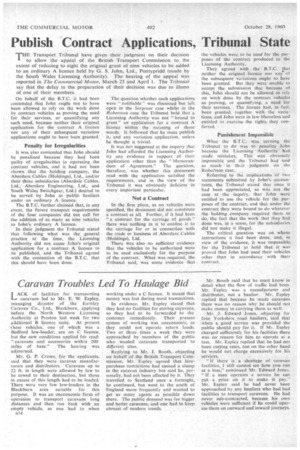Publish 'Contract Applications, Tribunal State
Page 68

If you've noticed an error in this article please click here to report it so we can fix it.
THE Transport Tribunal have given their judgment on their decision
to allow the appeal of the British Transport Commission to the extent of reducing to eight the original grant of nine vehicles to be added to an ordinary A licence held by G. S. John, Ltd., Pontypridd (made by the South Wales Licensing Authority). The hearing of the appeal was reported in The Commercial Motor, March 25 and April 1. The Tribunal say that the delay in the preparation of their decision was due to illness of One of their members.
On behalf of the B.T.C. it had been contended that John ought not to have been allowed to rely on the work done by contract vehicles as proving the need for their services, or quantifying any such need, because neither their original application for the contract A licence nor any of their subsequent variation applications ought to have been granted.
Penalty for Irregularities It was also contended that John should be penalized because they had been Ruilty of irregularities in operating . the contract vehicles, and it had not been shown that the holding company, the Aberdare Cables (Holdings), Ltd., and/or their three subsidiaries (Aberdale Cables, Ltd., Aberdare Engineering, Ltd., and South Wales Switchgear, Ltd.) desired to be served by John as public hauliers under an ordinary A licence:
The B.T.C. further claimed that, in any event, the future transport requirements of the four companies did not call for the addition of as many as nine vehicles to John's ordinary A licence.
In their judgment the Tribunal stated that following what was the general practice at the time, the Licensing Authority did not cause John's original application for a contract A licence to be published, and the Tribunal agreed with the contention of the B.T.C. that this should have been done.
The question whether such applications were "notifiable" was discussed but left open in the Sergeant case whilst in the Robertson case the Tribunal held that a Licensing Authority was not "bound to grant" an application for a contract A licence within the meaning of those words. It followed that he must publish it; and any variation application, unless he thought it trivial.
It was not suggested at the inquiry that John had afforded the Licensing Authority any evidence in support of their application other than the " Memorandum of Agreement" The question, therefore, was whether this document read with the application satisfied the requirements, and in the view of the Tribunal it was obviously deficient in every important particular.
Not a Contract In the first place, as no vehicles were specified, the document did not constitute a contract at all. Further, if it had been "a contract for the -carriage of goods" there was nothing in it to confine it to the carriage for or in connection with the trade or business of Aberdare Cables (Holdings), Ltd.
There was also no sufficient evidence that the vehicles to be authorized were to be used exclusively for the purpose of the contract. What was required, the Tribunal said, was some "evidence that the vehicles were to be used for the purposes of the contract produced to the Licensing Authority.
They agreed with the B.T.C. that neither the original licence nor any of the subsequent variations ought to have been granted. But they were unable to accept the submission that because of this, John should not be allowed to rely on work done by the contract vehicles as proving, or quantifying, a need for their services.. The licence had, in fact, been granted, together with the variations, and John were in law blameless and entitled to exercise the rights they Conferred.
Punishment impossible
What the B.T.C: was inviting the Tribunal to do was to penalize John because the Licensing Authority had made mistakes, This was obviously impossible and the Tribunal had Said as much :"in their judgment on the -Robertson case.
Referring to the implications. of two statements submitted by John's accountants, the Tribunal stated that once it had been appreciated, as was not the case. at the inquiry, that John were entitled to use the vehicle for the purposes of the contract, and that under the contract they were bound to do whatever the holding company required them to do, the fact that the work that they had done was, in a sense, for the subsidiaries did not make it illegal.
The critical question was on whose instructions it had been done, and; in view of the evidence, it was impossible, fot the Tribunal to • hold that it was proved that John had used their vehicles other than in accordance with their contract.




















































































































